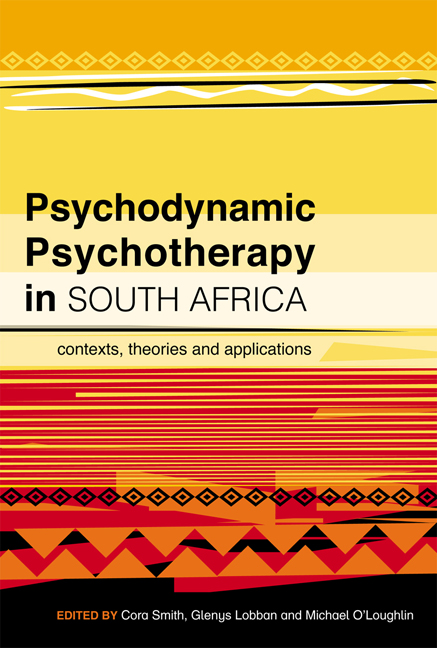Book contents
- Frontmatter
- Contents
- Editors
- Contributors
- Acknowledgements
- Acronyms
- Introduction Cora Smith
- Section I Subjectivity and identity
- Section II Traumatic stress
- Section III Social issues
- Chapter 6 Unconscious meaning and magic: Comparing psychoanalysis and African indigenous healing
- Chapter 7 Intimate partner violence in post-apartheid South Africa: Psychoanalytic insights and dilemmas
- Chapter 8 Serial murder and psychoanalysis in South Africa: Teasing out contextual issues amid intrapsychic phenomena in two case studies
- Chapter 9 Some psychoanalytic reflections on a project working with HIV orphans and their caregivers
- Chapter 10 Reclaiming genealogy, memory and history: The psychodynamic potential for reparative therapy in contemporary South Africa
- Afterword Glenys Lobban and Michael O'Loughlin
- Index
Chapter 6 - Unconscious meaning and magic: Comparing psychoanalysis and African indigenous healing
from Section III - Social issues
Published online by Cambridge University Press: 21 April 2018
- Frontmatter
- Contents
- Editors
- Contributors
- Acknowledgements
- Acronyms
- Introduction Cora Smith
- Section I Subjectivity and identity
- Section II Traumatic stress
- Section III Social issues
- Chapter 6 Unconscious meaning and magic: Comparing psychoanalysis and African indigenous healing
- Chapter 7 Intimate partner violence in post-apartheid South Africa: Psychoanalytic insights and dilemmas
- Chapter 8 Serial murder and psychoanalysis in South Africa: Teasing out contextual issues amid intrapsychic phenomena in two case studies
- Chapter 9 Some psychoanalytic reflections on a project working with HIV orphans and their caregivers
- Chapter 10 Reclaiming genealogy, memory and history: The psychodynamic potential for reparative therapy in contemporary South Africa
- Afterword Glenys Lobban and Michael O'Loughlin
- Index
Summary
Nearly two decades after the transition to democracy in South Africa, the mental health field has revealed itself to be a fascinating attractor for a range of cultural, political, legal and philosophical debates, inevitably shaped by the country's turbulent past and questions about its future. Two recent events establish the context for this chapter. In 2009 the South African Psychoanalytic Association was accredited as an official International Psychoanalytical Association study group, with the ultimate aim of training psychoanalysts in accordance with international standards. Five years earlier the South African parliament passed the Traditional Health Practitioners Act (No. 35 of 2004), aimed at recognising and integrating traditional healers into the country's official healthcare system. The historical juxtaposition of these two events invites a consideration of the relationship between psychoanalysis and indigenous African healing.
The existing meagre comparative local literature focuses more generally on biomedicine and indigenous healing, the politics of mental health, or on the role of indigenous beliefs in the context of integrative trauma therapy (Eagle, 2004; Straker, 1994). Few authors (I know only of Buhrmann, 1986, and Maiello, 1999) have published comparative work on psychoanalysis and traditional healing in the South African context. The aim of this chapter is to extend and sharpen the comparative discussion of these two healing systems. In the course of doing so I will not simply examine traditional healing from the perspective of psychoanalysis, but also highlight the peculiarities of psychoanalysis and consider its ‘place’ in the South African context.
My interest in comparing psychoanalysis and indigenous healing has three professional tributaries. Firstly, my role in training South African clinical psychologists in psychoanalytic psychotherapy has exposed me to the tensions between traditional African belief systems and those informing the psychoanalytic worldview. Many African trainee psychologists, particularly those raised in rural communities, have consulted indigenous healers and been raised in cultures imbued with these healing practices and their attendant philosophies. Comparisons between psychoanalytic and indigenous healing thus arise regularly in seminar discussions about the nature of the therapeutic enterprise. These discussions have required that I, a white psychoanalytically oriented therapist, acquaint myself with the culturally embedded healing traditions familiar to my students.
- Type
- Chapter
- Information
- Psychodynamic Psychotherapy in South Africacontexts, theories and applications, pp. 141 - 168Publisher: Wits University PressPrint publication year: 2013



